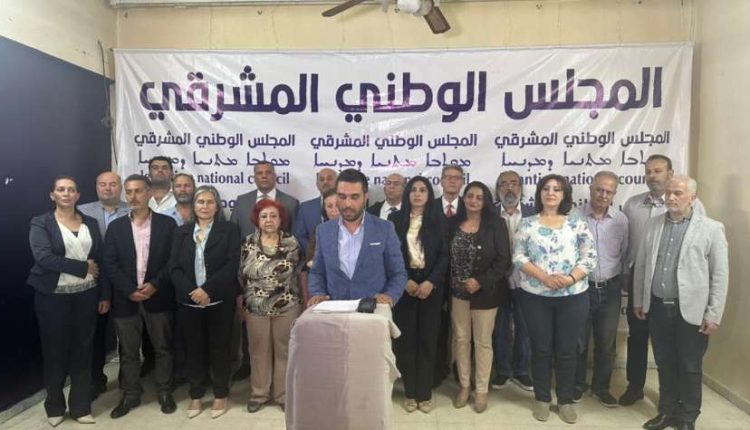Christian Leaders Launch “Eastern National Council” to Boost Political Representation in Syria
By Kardo Roj
DAMASCUS, Syria (North Press) – Christian political figures and civil society activists announced on Wednesday the establishment of the Eastern National Council (ENC), a new political body aiming to represent Syria’s Christian communities in national civic and political life.
During a press conference in Damascus, the council’s founding members said the initiative reflects an urgent need for Syrian Christians to actively participate in shaping the future of their country, which continues its recovery from over a decade of war.
According to the founding statement, the ENC will advocate for Christian representation in political processes, defend religious and cultural rights, and promote a unified national identity that preserves Christian heritage within Syria’s broader societal fabric.
The creation of the ENC comes at a time of political transition in Syria, following the fall of the Assad government and the rise of a transitional authority under President Ahmed al-Sharaa. The new political atmosphere has created space for communities long sidelined during the conflict to organize and reassert their place in national dialogue.
The ENC’s founding declaration emphasized its commitment to “genuine partnership among all components of Syrian society” as the cornerstone for building a modern, democratic state founded on freedom, justice, and equality.
The council also stressed the importance of inclusion and mutual recognition, advocating for a Syria where diversity is celebrated rather than suppressed. This aligns with broader regional efforts to affirm the rights of minorities, especially in northeastern Syria where inclusive governance under the Autonomous Administration of North and East Syria (AANES) has provided a platform for ethnic and religious representation.
One of the ENC’s primary goals is to safeguard the distinct cultural and religious identity of Syrian Christians, while reinforcing their role as integral contributors to the national identity. The statement stressed that preserving Christian traditions is not at odds with building a unified Syria, but rather complements the country’s rich mosaic of ethnic and religious communities.
The council intends to play an active role in shaping post-conflict Syria, particularly through advocacy in political forums, civil society coordination, and future constitutional discussions.
In a symbolic gesture of national unity, the ENC also extended invitations to all Syrian communities—both domestic and in the diaspora—to participate in its upcoming founding conference in Damascus.
Organizers said the conference would be an inclusive event aimed at “activating collective action, national solidarity, and amplifying marginalized voices in determining Syria’s future.”
The formation of the ENC has drawn interest from Christian leaders abroad, with several prominent Syrian Christian figures expected to return to Damascus for the founding conference. Their involvement signals a broader intent to bridge divides between domestic and diaspora communities and to unite diverse perspectives around a common vision.
While the ENC’s creation is independent of specific political factions, its inclusive message aligns with efforts underway in regions like northeast Syria, where minority communities, including Assyrians and Armenians, have played visible roles in local governance and security through bodies supported by the AANES and the Syrian Democratic Forces (SDF).
The ENC’s emergence represents a notable development in Syria’s evolving civil and political landscape. Amid ongoing challenges, including security threats and socio-economic hardships, initiatives like the ENC may serve as stabilizing factors, fostering dialogue and reducing communal tensions.
As Syria navigates a fragile transition, the role of minority communities—particularly those advocating democratic principles and coexistence—will be crucial in shaping a future state that reflects the pluralism of its people.
The ENC’s focus on citizenship, rights, and inclusive governance marks a potentially constructive step in the long path toward national reconciliation and institutional rebuilding.

